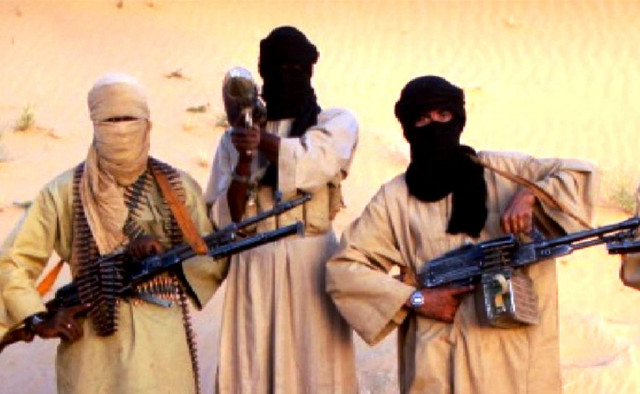Qaeda-linked extremist groups operating in Africa
Several radical extremist groups openly declare their alliance with al Qaeda and carry out criminal activities.

al-Qaeda in the Islamic Maghrib (Aqim):
This group was born in 2006 when the radical Algerian Salafist Group for Preaching and Combat pledged allegiance to slain al Qaeda leader Osama bin Laden.
AQIM soon set up bases in northern Mali, becoming involved in drug trafficking and regularly kidnapping westerners for stiff ransoms, some of whom have been killed.
In 2010 Anthony Holmes deputy commander for the United States Africa Command (Africom), told AFP there were no more than 300 members of AQIM, but they had known ties to al Qaeda in Afghanistan/Pakistan and were considered a serious threat.
AQIM has kept a background presence in the extremist takeover of northern Mali, and analysts say they seem content to allow other groups to take credit for events there, raising questions over their ultimate motives.
Ansar Dine (Defenders of Faith)
This previously unknown group emerged on the flanks of Tuareg rebels who spearheaded the takeover of northern Mali in March.
It is led by Iyad Ag Ghaly, a Tuareg himself. He was once heavily involved in earlier rebellions before switching sides to government and getting involved in peace talks.
This led to his deployment as an envoy to Saudi Arabia before he was expelled for having links to militants.
"I am not for independence, I want sharia for my people," said the man shortly after the takeover. Since then Ansar Dine has enforced Islamic law across the main northern cities.
Women have been forced to cover up and smokers, drinkers and unmarried couples with children have been whipped.
Ag Ghaly has also been seen in the north with some of AQIM's top leaders, such as Mokhtar Belmokhtar.
Enforcing their total control over the region, Ansar Dine has pushed out the Tuareg rebels, and set about destroying ancient shrines in Timbuktu, a World Heritage site, which they consider idolatrous.
Movement for Oneness and Jihad in West Africa (MUJAO)
MUJAO emerged as a dissident group of AQIM seeking to spread jihad in West Africa, but as one US-based analyst on North African militancy told AFP "their public actions are at odds with their words."
Most of their actions have so far been aimed at Algeria.
The group took control of the northern Mali city of Gao in the March takeover, and has claimed the kidnap of several Algerian diplomats from the city as well as several bloody attacks against Algerian forces.
At the end of June, in bloody clashes that left some 35 dead, the group pushed out the Tuareg rebels who helped them seize Gao.
Boko Haram
The militant group, whose name means 'Western education is sinful' is believed to have been operating in Nigeria since 2002, but was temporarily crushed in a 2009 military offensive that left hundreds dead.
It resurfaced in 2010 and has since then dramatically intensified its insurgency, attacking, among other targets, churches, the security forces and prominent government installations.
The US State Department said the group has killed more than 1,000 people since the begining of 2011.
Some analysts say there are ties between Boko Haram and AQIM or Shebab in Somalia, but these links remain a subject of extensive debate.
Others insist the group has a narrowly domestic focus, and that to stem the violence a Nigerian political solution is required. Desperate poverty in the mainly Muslim north is cited as a key factor.
Shebab
Active in Somalia, the group was designated a terrorist organisation by the United States in 2008, but only formally joined al Qaeda in 2012.
This came as the group found itself on the backfoot militarily in terms of territorial control, pulling out of the war-torn capital Mogadishu last August and having lost several key towns since then.
African Union troops as well as Ethiopian soldiers are pushing into Shebab-held southern Somalia, with multiple reports of covert assistance by Western forces, including US survelliance drones and missile strikes.
The United States last month placed seven top leaders of the Shebab on its wanted list, offering up to $33 million for tip-offs to aid the hunt for the men.
In February, the Shebab were estimated to number overall between 5,000 and 8,000 men; of them around 2,000 were thought to be regular, well-trained full-time fighters.
However, as they lose ground militarily, they have been blamed for a series of attacks in neighbouring Kenya.
On Monday, Kenyan Prime Minister Raila Odinga expressed concern the Shebab "could link up with other terrorist groups like Boko Haram in Nigeria."
He was the day after masked gunmen killed 17 people in attacks on two churches, the worst such attack for a decade.
But the Shebab themselves have offered little public support for other African extremists speaking instead of ties to the Yemen-based al Qaeda in the Arabian Peninsula.



















COMMENTS
Comments are moderated and generally will be posted if they are on-topic and not abusive.
For more information, please see our Comments FAQ